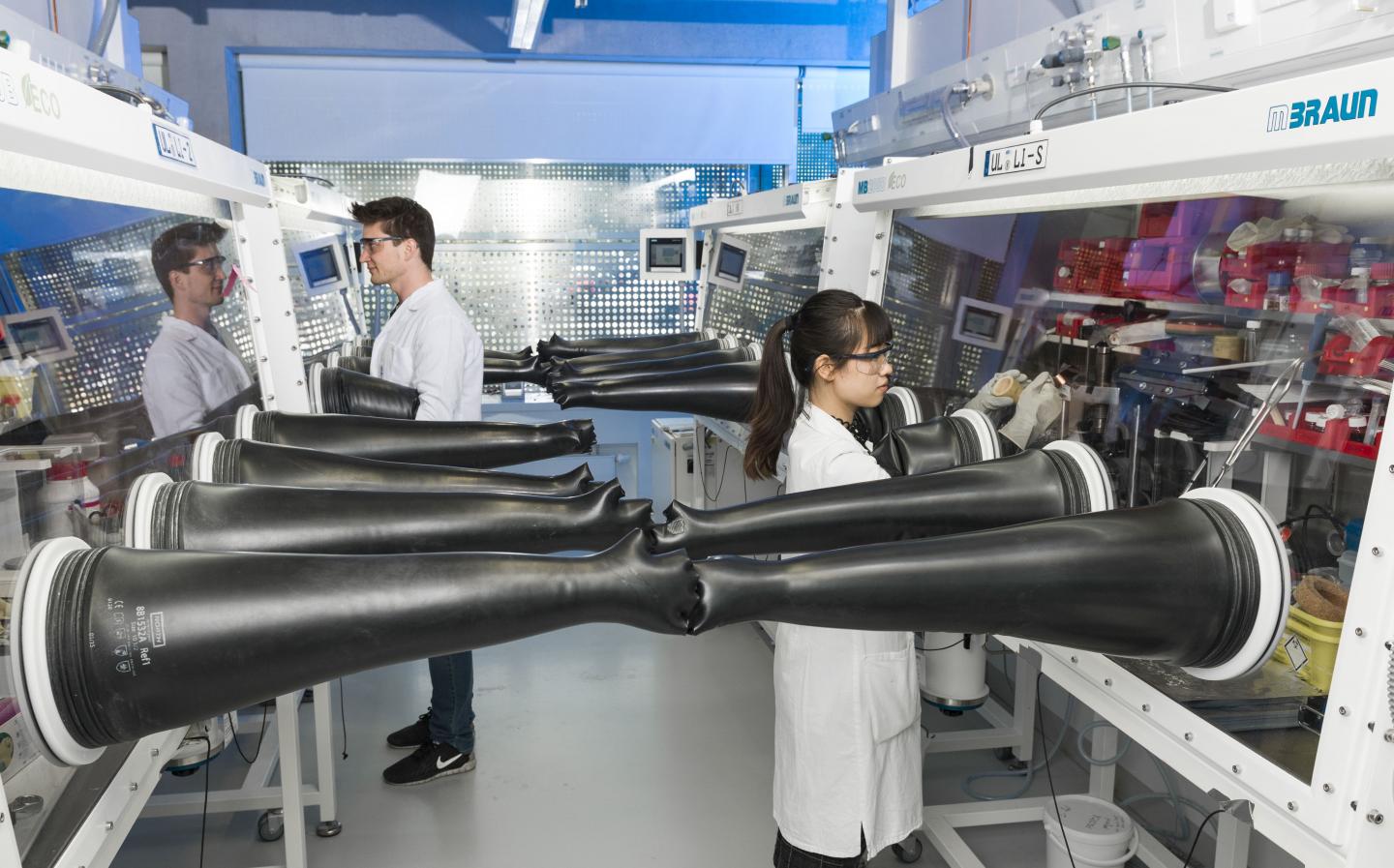Within the European Research Project E-MAGIC, KIT and Helmholtz Institute Ulm (HIU) Develop a Magnesium-based Energy Storage Technology together with Cooperation Partners

Credit: Laila Tkotz/KIT
A better performance, lower costs, and enhanced safety compared to lithium-ion batteries: These are the hopes of scientists of Karlsruhe Institute of Technology (KIT) and their cooperation partners in relation to novel magnesium batteries to be developed under the E-MAGIC research project. E-MAGIC is funded by the European Union (EU) with more than EUR 6.5 million and is to pool the relevant activities of various European science institutions.
Compared to conventional lithium-ion batteries, a magnesium battery has many advantages: When using magnesium as an anode material, energy density is increased and safety is enhanced. “Magnesium is a very promising material and one of the most important candidates for our post-lithium strategy,” says Professor Maximilian Fichtner, Deputy Director of the Helmholtz Institute Ulm (HIU), a research institute established by KIT in cooperation with Ulm University and the associated partners DLR and ZSW for the investigation and development of electrochemical battery concepts. “Wide availability of magnesium batteries might push electrification of mobility and increasing use of decentralized home storage systems.” To accelerate the development of the novel battery type, HIU cooperates with other scientific institutions in the area of battery and materials research within the research project European Magnesium Interactive Battery Community (E-MAGIC). This project funded by the EU under the “Horizon 2020” program will pool the expertise of ten scientific institutions, with the HIU being granted a high six-digit amount. E-MAGIC is coordinated by the Fundación Cidetec, Spain.
E-MAGIC is to pool all steps required for the development of magnesium batteries, from fundamental research to cell production processes. Researchers of HIU will work on understanding the obstacles and challenges on the level of materials and on designing new solutions for current problems. “As regards magnesium batteries, the biggest challenge consists in a long service life,” says Dr. Zhirong Zhao-Karger, who coordinates project-related activities of the solid state chemistry group of HIU. Yet, the new battery material has numerous positive properties that can be used: for example, no dendrites are formed at the magnesium anodes. When using lithium-ion batteries, such electrochemical deposits on the electrodes may form needle-shaped structures and cause damage or even short circuits. “In the case of magnesium, there are no such processes. Hence, we can apply magnesium in metallic form and directly use the high storage capacity of the metal. This enhances the performance of the battery,” Zhao-Karger says.
Apart from the higher safety and energy density, use of magnesium technology for battery production might help reduce the dependence on lithium as a raw material. Compared to lithium, magnesium availability on earth is higher by a factor of 3000. Moreover, it can be recycled more easily. Consequently, magnesium batteries would also be cheaper than lithium-ion batteries. In the case of quick progress in Europe, magnesium batteries might also help reduce the dominance of Asian manufacturers of battery cells and establish competitive battery production in Europe.
###
More Information:
https:/
About the Helmholtz Institute Ulm (HIU)
The HIU was established in January 2011 by Karlsruhe Institute of Technology (KIT), member of the Helmholtz Association, in cooperation with Ulm University. With the German Aerospace Center (DLR) and the Center for Solar Energy and Hydrogen Research Baden-Württemberg (ZSW), two other renowned institutions are involved in the HIU as associated partners. The international team of about 120 scientists at HIU works on the development of future energy storage systems for stationary and mobile use.
Find more on HIU at: http://www.
More about the KIT Energy Center: http://www.
Press contact: Martin Heidelberger, Redakteur/Pressereferent, Tel.: +49 721 608-21169, [email protected]
Being „The Research University in the Helmholtz Association”, KIT creates and imparts knowledge for the society and the environment. It is the objective to make significant contributions to the global challenges in the fields of energy, mobility and information. For this, about 9,300 employees cooperate in a broad range of disciplines in natural sciences, engineering sciences, economics, and the humanities and social sciences. KIT prepares its 25,100 students for responsible tasks in society, industry, and science by offering research-based study programs. Innovation efforts at KIT build a bridge between important scientific findings and their application for the benefit of society, economic prosperity, and the preservation of our natural basis of life.
Media Contact
Monika Landgraf
[email protected]
49-721-608-21105




